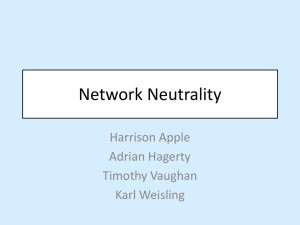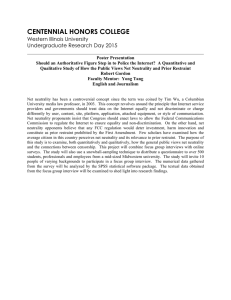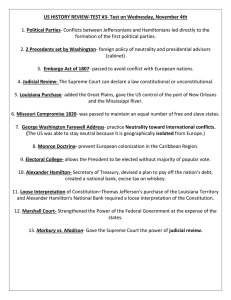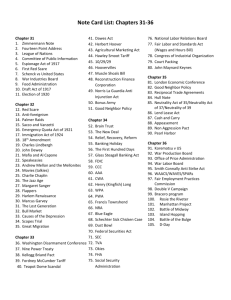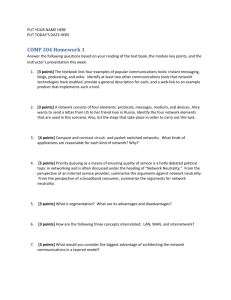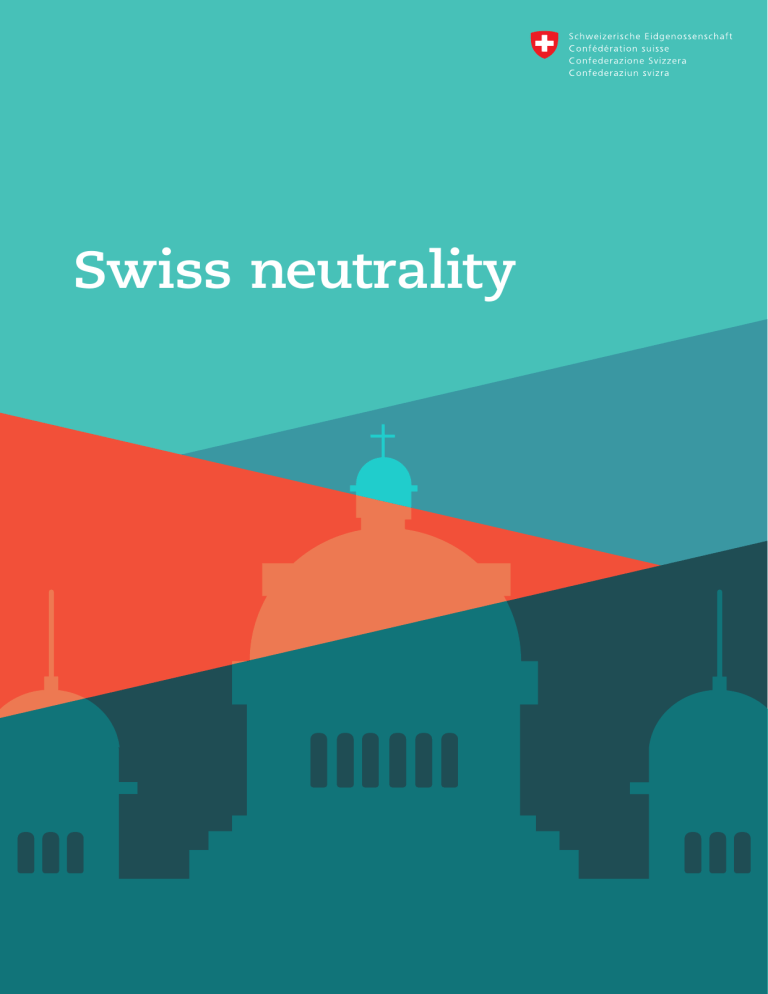
Swiss neutrality Foreword “If neutral Switzerland did not exist, we [would have] had to invent it,” said an adviser to John F. Kennedy in 1962, the year of the Cuban Missile Crisis. Fortunately, this is not necessary: Swiss neutrality has existed for centuries and is widely recognised internationally. But what does neutrality actually mean? It has a number of different aspects. Our self-image as Swiss nationals is closely linked to neutrality. It is an integral part of our identity and our origins. It is thus hardly surprising that in the annual security-related studies conducted by ETH Zurich, a large majority of respondents are in favour of maintaining our neutrality. Historically, neutrality played an important role in the creation of the Swiss nation. It was already mentioned in 1647 in documents of the then Tagsatzung, the Federal Diet of Switzerland. In 1815, it was internationally recognised at the Congress of Vienna. And since the founding of the Swiss Confederation in 1848 it has been an important element of our security and foreign policy. Neutrality also has a legal dimension: Switzerland’s permanent neutrality is recognised in international law. Equally, international law contains rules on what rights a neutral state is entitled to and what obligations it has when other states wage war. Finally, neutrality also has a broader foreign and security policy dimension: Switzerland pursues a policy of neutrality in order to ensure its continued credibility as a neutral state. This also includes the special role we play internationally by mediating and building bridges in cases of tensions. With this joint brochure of the FDFA and the DDPS, we set out what Switzerland’s neutrality means and how it is implemented. Swiss neutrality no longer needs to be invented, but understanding its importance and role is important for our country, today and in the future. Ignazio Cassis, President of the Swiss Confederation Head of the Federal Department of Foreign Affairs Table of Contents What ‘neutrality’ means 4 Law of neutrality 4 Neutrality policy 5 Swiss neutrality 6 Characteristics of Swiss neutrality 6 When does neutrality apply? 7 Swiss neutrality in its historical context 8 Neutrality in practice 12 Switzerland’s relations with international organisations 12 Neutrality as an opportunity for peace promotion 14 Neutrality in security policy 15 Current challenges for neutrality 17 Neutrality in a nutshell 18 What ‘neutrality’ means The neutrality of a state is determined by the law of neutrality, the policy of neutrality and the history and traditions of the country. The law of neutrality sets out the rights and obligations of a state with neutral status. A policy of neutrality comprises all measures that a neutral state takes on its own initiative to ensure the predictability and credibility of its permanent neutrality. Accordingly, the implementation of a policy of neutrality is always related to the current international environment. Neutrality means non-intervention. The term ‘neutral’ comes from Latin and is composed of the two words ‘ne’ (not) and ‘uter’ (either), i.e. ‘neither’. Law of neutrality The law of neutrality is enshrined in the 1907 Hague Conventions on the rights and duties of neutral powers and persons in the event of war on land or at sea, which Switzerland ratified in 1910. These are the only international agreements that regulate the law of neutrality. They have however evolved under customary law: today the same rules apply not only to wars on land or at sea, but also aerial warfare. The 1907 Hague Conventions and customary law are directly applicable in Switzerland. The law of neutrality is part of international law. Since the law of neutrality refers exclusively to the rights and duties of neutral states during armed conflicts between other states, it is sometimes also referred to as part of the international law of war. 4 International law is the set of legally binding rules applicable at the international level. These are found in international treaties, customary international law and general principles of law. In Switzerland, international treaties are subject to approval by the Federal Assembly. Swiss voters have the right to call for an optional referendum against international treaties. Compliance with and promotion of international law is an objective of Switzerland’s foreign policy. Duties of a neutral state Rights of a neutral state The law of neutrality sets out the following duties for a neutral state: The law of neutrality also provides for a neutral state’s rights: Æ The law of neutrality obliges a neutral state not to participate in any international armed conflicts. Likewise, a neutral state may not militarily favour warring parties, whether with troops, armaments, or by making its own territory available. Æ The neutral state has the right to inviolability of its territory. Warring parties are prohibited from transporting troops, ammunition or food convoys across the territory of a neutral state, whether by land, sea or air. Æ Furthermore, a neutral state must ensure the inviolability of its own territory, but only within the limits of what is reasonable: it cannot and must not be prepared to resist every attack. To ensure the inviolability of its territory, the neutral state may cooperate with other states, for example in the procurement of armaments or in military training. Æ The neutral state also has the right to self-defence. It can repel an attack on its territory by force. Æ In peacetime, according to the law of neutrality, the neutral state may not enter into any obligations that would result in a violation of its neutrality in the event of war. For example, it cannot join a military alliance such as NATO, which provides for mutual assistance in the event of war. Æ Moreover, the law of neutrality does not restrict the neutral state in its diplomatic and economic relations, leaving it the right to trade freely, as long as this does not serve military purposes. The North Atlantic Treaty Organization (NATO) was founded on 4 April 1949 with the signing of the North Atlantic Treaty in Washington. The core of the treaty is the obligation to assist, which is set out in Article 5: an armed attack against one NATO member is considered an attack against them all. It obliges the allies to stand by the attacked state and to jointly exercise the right to self-defence. Neutrality policy Neutrality policy is the totality of measures taken by a state, beyond compliance with the law of neutrality, to maintain and promote the credibility and effectiveness of its status as a neutral state in the international community. A neutral country has considerable room for manoeuvre when it comes to shaping its neutrality policy. Neutrality policy is based on the respective situation, the country’s interests, the international context and the country’s history and traditions. It has primarily a foreign and security policy function: to contribute to the realisation of national objectives, in particular the preservation of the existence of the neutral state under international law, the guarantee of security and keeping out of armed conflicts. As detailed in the next section, Switzerland has never taken neutrality to be a rigid statute of foreign and security policy, but uses it as a flexible instrument to safeguard the independence, security and welfare of our country. It defines its position on the basis of the specific circumstances of the individual case. 5 Swiss neutrality The Federal Constitution defines the preservation of neutrality as the task of the Federal Council and Parliament (Art. 173 and 185). In this regard, the Federal Council has stated on several occasions that it does not consider it expedient to further anchor the core definition of neutrality in the Federal Constitution or in national laws, as this would restrict Switzerland’s room for manoeuvre in terms of security and foreign policy. Characteristics of Swiss neutrality Æ Switzerland’s neutrality is of its own choosing. Switzerland has often declared its wish to remain neutral (e.g. accession to the UN), but has never assumed or recognised an obligation to permanent neutrality under international law. It would therefore be entitled to abandon its neutrality at any time if it considered this necessary to safeguard its national interests. Æ Switzerland’s neutrality is based on armed neutrality. Switzerland has its own armed forces to defend its independence and territorial integrity. The Swiss Armed Forces also serve to prevent acts contrary to neutrality by belligerent states on Swiss territory. Neutral Switzerland has never left any doubt that it is prepared to use its conscript armed forces for self-defence when required. At the same time, however, it has always made clear that it refrains from enforcing its interests with armed force. A state can commit itself to neutrality either on an ad hoc basis or permanently. At any time it can declare its neutrality with regard to a specific international armed conflict on an ad hoc basis, or permanently, irrespective of any specific context. It is however important that a state’s neutrality is recognised internationally. Otherwise, neutrality cannot fulfil its purpose of preserving the independence and territorial integrity of the state. Æ Permanent armed neutrality was internationally recognised at the Congress of Vienna in 1815 in a declaration by the great European powers Russia, England, Prussia, Austria and France. Æ Swiss neutrality is permanent. Switzerland remains neutral in any armed conflict between other states, whoever the warring parties are, whenever and wherever a war breaks out. This is in contrast to a state that declares itself temporarily neutral in relation to a specific armed conflict until its end. 6 At the Congress of Vienna in 1815, the great European powers stated in the Declaration of 20 March that Switzerland’s perpetual neutrality was in the interests of the common good. They held out the prospect of recognition under international law. Eight months later, the Great Powers signed the Treaty of Paris on 20 November 1815 , recognising Switzerland’s perpetual neutrality and guaranteeing the inviolability of Swiss territory. This was the first time Switzerland’s neutrality had been recognised under international law. When does neutrality apply? To better understand neutrality, it is important to distinguish between different contexts. When is neutrality applicable? Æ Neutrality is only applicable to conflicts between states. What else applies with regard to neutrality? Æ Neutrality prohibits the military favouring of parties to a conflict. Diplomatic or economic relations with warring parties may continue to be maintained at the discretion of the neutral state, provided they do not amount to military support. Æ Neutrality is only applicable to international armed conflicts. When is neutrality not applicable? Æ Neutrality is not applicable if the UN Security Council, based on chapter VII of the UN Charter, authorises measures to maintain or restore international peace and security. Æ Neutrality is not applicable if an armed attack by another state occurs. In this case, the neutral state concerned may defend itself with all lawful means at its disposal. This also includes cooperation with other states for common defence. Æ Neutrality is not applicable to internal armed conflicts or to conflicts between non-state actors. It is not applicable to political disputes between two states. Æ Neutrality has no bearing on migration and refugee movements, which are often consequences of armed conflicts, environmental destruction and natural disasters. Humanitarian aid and development cooperation as well as refugee and disaster relief in favour of affected population groups can also be provided in countries involved in an international armed conflict. This is in line with Switzerland’s humanitarian tradition. Æ Neutrality is a behaviour in an international armed conflict, not a stance on specific issues. It is not neutrality of opinion. Neutrality does not mean impartiality: even a neutral state has the right to political opinions and cooperation, and can stand up for its fundamental values such as democracy, the rule of law and human rights. 7 Swiss neutrality in its historical context Developments in Switzerland’s policy of neutrality in the 20th century 1938–1945 Increasing global political tensions led Switzerland to refrain from economic sanctions again and to return to full neutrality. At the beginning of the Second World War, the Federal Council reaffirmed Switzerland’s neutrality, which was recognised by the warring parties. To assert its independence and neutrality, Switzerland mobilised its armed forces. Despite great pressure, Switzerland was able to maintain its neutrality during the Second World War. But in the trade war between the warring parties, it had to make concessions. From the final rep ort of the Indepen dent Commission of Experts Sw itzerl an d, Second World Wa r: “In the Second World War the rules of the general law of neutrality were violated to a large degree. In the case of Sw itzerl and too, there were vio lat ions of the neutr ali ty law by the belligerents. On th e other hand, Sw itz erl an d did not always str ict ly ful fil its duties unde r th e ne utrality law. In calculat ing Sw itzerl and’s intere st in de fence, foreign, and econom ic policies in the Se co nd Wo rld War, neutrality pla yed a major role. Ac co rdi ng to assessment s made by authorities and individuals at the time, it contr ibu ted subs tantially to keeping the country out of the war. St ill , no on e dis puted the fac t that Sw itzerl and was spared, th an ks ch iefly to determined fight ing by the All ies and go od for tune.” 1919–1938 After the traumatic experiences of the First World War, a new world order was to be created. The idea of an ‘association of states’ was discussed, with the goal of preventing future ernmental an intergov at ions was N of ue to being ag The Le a. It came in sed in Genev ba on ti af ter the sa ce organi e Conferen e Pari s Peac th of . It was lt 20 su as a re work in 19 d began it s an ar W curing ld se or y Firs t W permanentl it s goal of l lfi ional fu at to rn unable ent of inte the sett lem h ug da ro an t th e peac sarmamen rnat ional di te in , of the ts d ic en e th confl rity. A fter cu se ve ti llec e United system of co unding of th ar and the fo W ld or uding W cl in Second members, then st il l 43 s it , ssolve ns di io Nat cided to animously de un d, fect . an rl ef ze te Sw it h immedia Nat ions w it of ue ag Le the 8 wars. A period of active Swiss foreign policy began. Switzerland’s neutrality was recognised “for the maintenance of peace” in the Treaty of Versailles in 1919. In 1920 Switzerland joined the League of Nations. As a neutral country, it was exempt from participating in League of Nations military sanctions, but was prepared to share in economic sanctions. 1945–1990 After 1945, under the effect of the continuing political tensions between East and West during the Cold War, Switzerland adopted a very strict and narrow approach to its neutrality compared to other neutral states. It thus refrained from joining international organisations with a political character. It did not join the Council of Europe until 1963, and in 1975 in Helsinki it signed the Final Act of the Conference on Security and Co-operation in Europe, now the OSCE. In the Helsinki Final Act, the participating states recognised the right to neutrality of all members. From 1990 The epochal upheavals following the fall of the Berlin Wall and the collapse of the Soviet Union fundamentally changed Switzerland’s foreign and security policy environment. On the one hand, opportunities emerged for a peaceful, united and free Europe. There was the prospect of a system that could peacefully reconcile conflicting interests and keep lawbreakers in check. On the other hand, with the disintegration of old power relations, previously suppressed and new conflicts and thus new kinds of instability emerged. Against this backdrop, the Federal Council considered it necessary to adapt its neutrality policy to the new circumstances after the end of the Cold War, as it wrote in its White Paper on Neutrality of 29 November 1993. This document is still authoritative for Swiss neutrality today. It laid the foundation for the understanding that, following the end of the Cold War, security is best achieved through cooperation and that such cooperation can be done in a manner compatible with neutrality. Until 1919 Before 1900, Switzerland, as a confessionally, culturally and linguistically heterogeneous entity, found itself in the midst of tensions between rival major European powers and national movements in neighbouring states. The neutrality policy of sitting still and abstaining from foreign policy protected the Swiss Confederation from internal division and disintegration, as taking sides against foreign powers would have led to its tearing apart along confessional and linguistic-cultural lines. During the First World War, this approach secured Switzerland’s internal cohesion and played an important role in Swiss integration. 9 Swiss neutrality today In Switzerland, neutrality enjoys a high level of acceptance, indeed its retention is undisputed. This is reflected in the opinion polls carried out by the Center for Security Studies and the Military Academy at ETH Zurich as follows: Different attitudes towards neutrality “How do you think Switzerland can best safeguard its interests while contributing to security in the world?” (‘very much’ and ‘rather’ agree in %, rounded) 89 82 79 86 89 84 82 80 79 80 8989 83 82 88 65 64 60 69 65 62 87 89 94 92 93 93 93 95 94 96 95 95 95 95 96 96 96 80 57 53 54 57 52 49 “Switzerland should maintain its neutrality.” “Switzerland should take a clear stand for one side or the other in political conflicts abroad, but remain neutral in military conflicts.” (differential neutrality) “Switzerland should take a clear stand for one side or the other in military conflicts abroad.” (de facto renunciation) Source: annual security studies by the Center for Security Studies and the Military Academy at ETH Zurich (at the time of publication of this brochure, the most recent data is used). 10 '19 (1213) 16 15 '18 (1209) '17 (1209) '16 (1211) '15 (1239) 21 19 20 19 '14 (1200) 23 '13 (1200) '11 (1200) 25 25 '12 (1200) 27 21 '10 (1200) '08 (1200) 25 '09 (1200) 21 '07 (1200) '06 (1200) '05 (1200) 29 27 27 23 25 '04 (1200) 26 '02 (1201) '01 (1235) 29 '03 (1202) 34 '00 (1202) 32 '99 (1201) '98 (1000) '97 (1014) '95 (795) '94 (827) '93 (1003) … '90/91 (1005) '89/90 (1061) 25 28 29 28 24 '96 (821) 33 48 14 18 '21 (1228) 5959 65 64 64 63 65 62 63 61 59 60 58 '20 (1227) 59 63 62 63 The cornerstones of Swiss neutrality policy Security policy cooperation Neutrality does not prevent Switzerland from taking precautions to counter new threats that can often only be combated through international cooperation, such as in the areas of crossborder terrorism and cyberattacks. In doing so, Switzerland does not enter into any commitments which might pose the risk of being drawn into a conflict. It retains the freedom to decide at any time on measures it deems necessary, in complete political and military independence. Mention should be made of Switzerland’s participation in the Partnership for Peace (since 1996) and the deployment of Swiss Armed Forces personnel on international peacekeeping missions under UN mandate, such as in Bosnia and Herzegovina (since 1996) and in Kosovo (since 1999). Peacebuilding Based on its long-standing tradition of good offices and humanitarian aid, Switzerland accords its neutrality a peace-related and humanitarian orientation. It places its foreign policy and its neutrality at the service of international security, peace and solidarity. Neutrality helps to shape peace in Europe and the world and to facilitate contact with interlocutors. Switzerland is a member of various international organisations such as the UN and the OSCE. These memberships are compatible with Swiss neutrality. Free political opinion Switzerland’s neutrality does not impede its right to freely express political opinions in international bodies (such as the UN) or to actively work for the respect and promotion of Swiss fundamental values such as democracy, the rule of law and human rights. An integral part of Swiss identity Even if neutrality is no longer needed to hold Switzerland together along confessional, cultural and linguistic dividing lines, neutrality remains an important part of the tradition, history and self-image of Switzerland and its citizens. Neutrality enjoys strong support among the Swiss electorate, regardless of gender and across all age groups, all levels of education, all linguistic regions and the entire political spectrum. 11 Neutrality in practice Switzerland’s relations with international organisations Today, Switzerland is a member of various international organisations that promote peace and security as well as respect for human rights, the rule of law and democracy in Europe and the world. Membership of such international organisations is compatible with neutrality, provided they are not military alliances and Switzerland is not thereby obliged to provide assistance in an international armed conflict. United Nations (UN) Switzerland has been a member state of the UN since September 2002. Switzerland is the only country to have joined the UN on the basis of a referendum, with 54.6% of the electorate voting in favour of UN membership on 3 March 2002. The Swiss declaration of accession states that “Switzerland is a neutral state whose status is enshrined in international law” and that it “remains neutral even as a member of the UN”. Switzerland’s foreign policy objectives largely coincide with those of the UN: Peace and security worldwide, sovereign equality of all states and renunciation of violence in international relations. Switzerland pursues a fact-based policy. The resulting credibility it enjoys allows it to overcome deadlocks in the multilateral environment whenever possible and to implement projects together with like-minded states. For example, Switzerland helped to create the UN Human Rights Council in Geneva and is committed to a strong, functional and efficient UN – and especially to more transparency and improved working methods in the UN Security Council. The UN Security Council can impose sanctions on a member which are binding on all members. According to doctrine and established practice, this binding effect is also compatible with neutrality for neutral states, as the Security Council acts on behalf of the international community to restore world peace and international security. Therefore, the law of neutrality does not apply when the Security Council acts to restore international peace and security. Even before Switzerland joined the UN, the Federal Council voluntarily and autonomously implemented the Security Council’s sanctions from 1990. 12 According to the Armed Forces Act, Swiss Armed Forces personnel may be armed for their own safety and to fulfil their mission as part of a UN peacebuilding mission, however participation in peace enforcement operations is prohibited. In 2011, Switzerland submitted its candidacy for a non-permanent seat on the UN Security Council for 2023–24. In its 2015 report on the candidacy, the Federal Council stated that a Security Council mandate is compatible with Switzerland’s neutrality law and policy. A seat on the Security Council would open up special opportunities for Switzerland to contribute to peace and security worldwide on the basis of its independent foreign policy. Other neutral or non-aligned states such as Austria, Sweden, Finland and Ireland have repeatedly served on the Security Council. www.eda.admin.ch/uno et www.un.org Organization for Security and Co-operation in Europe (OSCE) Switzerland is one of the founding members of the OSCE. With 57 participating states in North America, Europe and Asia, the OSCE is the world’s largest regional security organisation. The OSCE aims to overcome differences, build trust and act together through dialogue. It focuses on issues such as arms control, democratisation and combating terrorism. As a neutral state and non-member of NATO and the EU, Switzerland is well placed to mediate in conflicts. Switzerland assumed the chairmanship of the OSCE in 1996 and in 2014. In 2014, it acted as mediator in the Ukraine conflict: the OSCE agreed on an observation mission. Switzerland also regularly provides the OSCE with specialists, for example for election observation and police work. www.osce.org European Union (EU) The EU is a key partner for Switzerland, also in the area of peacebuilding and security policy. Switzerland decides on a case-by-case basis and after thorough examination where it wants to cooperate with the EU in the area of security. Equally it decides based on a comprehensive assessment of interests whether and how it wants to participate in EU economic sanctions. In doing so, it takes into account neutrality law and policy as well as foreign policy and foreign economic aspects. In In the vast majority of cases, Switzerland supports EU sanctions. With specialists and members of the armed forces, it also participates in peace missions such as EUFOR Althea in Bosnia and Herzegovina and the EULEX rule of law mission in Kosovo. www.eda.admin.ch/europa et www.europa.eu North Atlantic Treaty Organization (NATO) / Partnership for Peace NATO membership is out of the question for Switzerland. NATO is a defence alliance whose North Atlantic Treaty obliges all members to assist each other in the event of war: in the event of armed attack, the member states are obliged to exercise what is known as collective self-defence. As a neutral country that may not favour any warring party in an international conflict, Switzerland cannot belong to NATO. However, Switzerland has participated in the Partnership for Peace since 1996. This was set up by NATO heads of state and government in 1994 to promote stability in the Euro-Atlantic area through cooperation with the former members of the Warsaw Pact, as well as with neutral states, beyond the old dividing lines. This participation is compatible with Switzerland’s neutrality law and policy: before the start of its participation, it explicitly stated that it is and will remain neutral. For Switzerland, the Partnership for Peace is part of its commitment to peace and security. It is an opportunity to cooperate with NATO and other partner states on a selective basis and according to its own interests in terms of security policy. Cooperation is on a voluntary basis and is determined by the respective partners themselves. www.nato.int 13 Neutrality as an opportunity for peace promotion On the one hand, neutrality means that Switzerland does not become involved in international conflicts; on the other hand, it helps Switzerland to implement its foreign and security policy priorities – in particular with regard to its commitment to peace and security. Thanks to its neutrality, its humanitarian tradition, its experience and expertise, Switzerland has substantial credibility in the area of peace promotion. Cst., Article 54, paragraph 2: “The Confederation shall ensure that the independence of Switzerland and its welfare is safeguarded; it shall in particular assist in the alleviation of need and poverty in the world and promote respect for human rights and democracy, the peaceful co-existence of peoples as well as the conservation of natural resources.” The fact that Switzerland is neutral, has no colonial past, does not belong to any power bloc and does not pursue any hidden agenda, facilitates its contacts with a wide variety of interlocutors, enabling it to play a constructive role. Good offices Over the past 15 years, Switzerland has developed a broad range of instruments to promote peace and security: Æ Good offices include Switzerland’s protecting power mandates. As a protecting power, Switzerland assumes some of the consular and/or diplomatic tasks between two countries that have partially or entirely broken off direct relations. A protecting power mandate allows such states to maintain low-level relations and provide consular assistance to their citizens in the other state. Æ In the field of facilitation and mediation, Switzerland has a toolbox which is recognised and in demand worldwide, and which is also successfully employed in peacebuilding. Impartial Switzerland can build bridges where others are deadlocked, it can work together with diverse partners and develop its own initiatives. Æ In providing the facilities for international peace conferences and negotiations, Switzerland is also consolidating its role as host state. This is based on Switzerland’s humanitarian tradition and history of good offices. Particularly through the influential position of International Geneva, which is the headquarters of numerous international organisations, this role helps to shape Switzerland’s image in the world. Participation in peace missions Within the framework of peace promotion, Switzerland participates in civilian and military peacekeeping missions: Æ Every year, Switzerland seconds around 200 civilian specialists to the headquarters of international organisations (UN, OSCE and EU) and to participate in their peace missions in crisis areas or in election observations. Æ Switzerland also participates in military peacebuilding missions. According to the Swiss Armed Forces Act, these deployments may be ordered on the basis of a UN or OSCE mandate. They must comply with the principles of Swiss foreign and security policy and thus also with neutrality. Participation of Swiss Armed Forces personnel in combat operations is excluded. Participation in peacebuilding missions, on the other hand, is voluntary. 14 Swisscoy: Since 1999, the Swiss Armed Forces have participated in the multinational KFOR mission to promote security and stability in Kosovo. The focus is on monitoring the situation and following security-related political developments. For this purpose, special military teams of around 10 people each are in regular contact with the population and gather information on the current situation. Swisscoy members are armed for self-protection. The Swiss Armed Forces also provide transport helicopters for KFOR. Æ Switzerland has been providing the UN with military observers and liaison and staff officers for peacebuilding missions since 1990. They are unarmed, must be strictly impartial and operate in international teams. Their classic tasks include monitoring ceasefires, implementing peace agreements, mediating between the parties involved and preventing dangerous escalations of conflicts. Neutrality in security policy International armed conflicts Switzerland always applies neutrality whenever at least two states are engaged in armed conflict. Switzerland’s neutrality prohibits it, for example, from making its territory or airspace available to warring parties for the transport of troops or weapons, and from providing them with military support. If there is a mandate from the UN Security Council for the conflict in question, Switzerland applies the economic sanctions in place against the warring parties and also supports military coercive measures as appropriate. After the war is over, Switzerland may participate in UN peacekeeping missions. Application of neutrality – examples Kosovo 1999: application of the law of neutrality In 1999, the conflict between the ethnic Serbian and Albanian populations in Kosovo escalated. Hundreds of thousands were forcibly displaced. To prevent further escalation, NATO initially intervened militarily without a mandate from the UN Security Council. As NATO’s combat operations were not authorised by a UN mandate, the Federal Council denied NATO transit rights for the combat mission, but largely upheld the EU’s non-military sanctions against the Federal Republic of Yugoslavia. Switzerland also provided humanitarian aid. The UN mandate was issued on 10 June 1999, after which Switzerland participated through Swisscoy in the international peacekeeping force in Kosovo, granting it transit rights over Swiss territory and through its airspace. In addition, since 2008 Switzerland has participated in the EU’s civilian rule of law mission EULEX in Kosovo. Iraq 2003: application of the law of neutrality A US-led coalition attacked Iraq in March 2003. As there was no mandate from the UN Security Council, Switzerland applied the law of neutrality. Before and during the conflict, military aircraft of the warring parties were not allowed to fly over Swiss territory. Furthermore, the Federal Council prohibited the export of war materiel and services to the states involved in the conflict. It did however authorise overflights for humanitarian and medical purposes. In addition, Switzerland offered humanitarian aid and organised two international conferences to share information, identify problems on the ground and facilitate the coordination of humanitarian aid in Iraq. Ukraine 2014 and 2022: application of the law of neutrality In 2014, Russia annexed the Crimean peninsula, which was a violation of international law. Switzerland then applied neutrality. Based on the situation at the time, it adopted measures to ensure that Swiss territory was not misused to circumvent international sanctions against Russia. At the end of February 2022, Russia attacked Ukraine militarily. In doing so, Russia massively violated elementary norms of international law. Neutrality remained applicable even during the military intervention. The Federal Council adopted the EU sanctions against Russia based on a comprehensive assessment of interests. In doing so, it took into account the law of neutrality and neutrality policy as well as foreign policy and foreign economic aspects. 15 Export of war materiel Overflight rights of aircraft of foreign states According to the law of neutrality, a neutral state must treat all warring parties equally with regard to the export of armaments. In addition to the law of neutrality, Switzerland has stipulated in its war materiel legislation that exports of war materiel will not be approved if the country of destination is involved in an armed conflict. Licences are only granted if the manufacture, brokerage, export and transit of war materiel is in accordance with international law, including the law of neutrality, international obligations and the principles of Swiss foreign policy. In contrast to Switzerland, Austria deviates from its obligations under neutrality law when it comes to the export of war material if the measures are within the framework of the EU’s Common Foreign and Security Policy. A belligerent state in an international armed conflict may not use the airspace of a neutral state for military purposes. The neutral state may not tolerate such acts which are contrary to neutrality in its airspace. Aircraft or helicopters of foreign states therefore require diplomatic clearance to fly over Swiss territory or to land in Switzerland. The authorities grant permission only if the overflights do not violate Switzerland’s neutrality. Security services provided abroad by private companies The Federal Act on Private Security Services Provided Abroad is intended to help preserve Swiss neutrality. The notification procedure for security services provided abroad ensures that the provision of these services does not conflict with Switzerland’s policy of neutrality. Services that contradict this purpose are prohibited. 16 Military cooperation Neutrality allows for military cooperation, for example in training, the procurement of armaments or in international peace support missions. Switzerland has concluded military training and armament cooperation agreements with various countries and regularly participates in international exercises with members of the Swiss Armed Forces. This cooperation helps to develop and improve Switzerland’s own military defence capabilities. As a neutral state, however, Switzerland may not enter into any military cooperation that could result in obligations of assistance or dependencies for it in the event of an international armed conflict. Current challenges for neutrality Neutrality has proven its worth in international armed conflicts as an instrument for protecting Switzerland’s independence and territorial integrity, and its application in these cases is based on clear practice. In recent decades, however, crises and conflicts have changed considerably and only seldom take place between different states. This raises questions about the law of neutrality, as it is not tailored to modern conflict patterns. Examples Internal or cross-border crises and conflicts Today, for the most part, armed conflicts no longer take place between states, but rather between state bodies and non-state actors. Sometimes a conflict can be between different non-state actors. Moreover, these conflicts can often have an international dimension because they cross borders or involve other states. Digital space States and non-state actors can use the digital space to carry out attacks in armed conflicts. As the digital space is not territorially limited, in many cases it cannot be determined beyond doubt which actors – state or non-state – are responsible for an attack. In each case, solutions must be found as to how to deal with such conflict patterns from the point of view of neutrality. However, this kind of approach is quite common in international law: international law must often be applied to situations for which it was not originally established. Switzerland therefore advocates at the international level for the clarification of such issues under international law. The resulting strengthening of international law serves security and peace worldwide and reinforces our status as a neutral country. 17 Neutrality in a nutshell 1 Neutrality is a successful instrument of Swiss foreign and security policy. It enjoys great support among the Swiss population. 2 Neutrality is composed of the law of neutrality and neutrality policy. The Federal Constitution defines the preservation of neutrality as the task of the Federal Council and Parliament (Art. 173 and 185). obliges neutrality The law of to st ate not the neutral at ional in any intern part icipate oops ac t to pl e tr ic ts and no e th of armed confl al spos or y at the di ng ri ar w or it s terr it e turn, th rt ies. In re y it il ab warring pa ol e invi t respec t th part ies mus y. or rr it ral st ate’s te of the neut 4 Neutrality policy includes measures taken by a neutral state to ensure the credibility and effectiveness of its neutral status in the international community. In addition to the rights and obligations laid down in international law, neutrality policy is based on the respective country’s interests, the international situation and the country’s history and traditions. 18 Switzerland’s neutrality is of its own choosing, permanent, internationally recognised and armed. Switzerland has its own armed forces to defend its independence and territorial integrity and to prevent acts by warring parties which are contrary to neutrality on its territory. 5 Neutrality does not prevent Switzerland from taking precautions to defend itself against new threats, which can often only be combated through cross-border cooperation. In doing so, Switzerland does not enter into any commitments which might pose the risk of being drawn into a conflict. 7 Ba s t ra ed on dit it s an d h ion o long um fg Sw -s t o a i a ne t zerl nit ar od of ndin ut a g fi i an nd ra c hu ma lity acco aid, es nit a r ar i pea ds it ce an s o r i - re l at e en t at d ion and . e ped t im o al n i l it c oes s po ty d i s l e a r r xp fo e ut r ely e ly work ss n ss e o f re Swi v t Swi i t f ac t no i gh o o r i t acy, s t r d t i an omo moc s r e n p d o i as and o pi n ec t su c h ht s . ue s re s p l ig a e r v h t l an e nt a n d hum m a d a w f un of l a u le r e th Publication details Published by: Federal Department of Foreign Affairs FDFA 3003 Bern www.fdfa.admin.ch Publication date: 04.03.2022 Design: Audiovisual Team, FDFA Communication, Bern Bern 2022 / © FDFA 20
